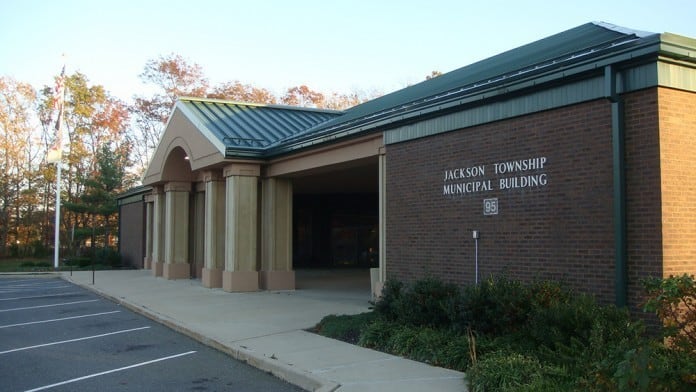
JACKSON – During a recent council meeting, the governing body tabled a resolution regarding the idea of members of the Orthodox Jewish community creating a perimeter wide eruv, a device used on their holy day. That resolution was tabled following a very vocal response by the public.
The council received considerable questioning by residents about the resolution. Residents also criticized council members for not gaining input from Jackson’s Orthodox Jewish community before proposing the resolution.
The eruv used by members of the Orthodox Jewish community can be made of string and tubing and is used in regard to the Jewish observance of the Shabbat, the Saturday holy day. During the Shabbat, no member of that faith is permitted to work. The traditional interpretations of Jewish law forbid moving an object from one domain to another, no matter its weight or purpose. Therefore, the eruv allows them to do things around their home and still be in observance.
In 2017, Jackson Eruv Association President Mordechai Burnstein notified the council of its plans to work with utility companies to affix eruvin (plural for eruv) to poles and other utility-owned areas. After the township opposed this plan it led to litigation between Jackson and members of the Orthodox Jewish community. Following legal mediation on the matter, the Jackson Council allowed for eruvin placement to be negotiated between members of the community and utility companies.
Burnstein, who is still the president and spokesman for the Jackson Eruv Association, said that he was not consulted about the resolution before it appeared on the agenda. “We had nothing to do with the drafting of the resolution. I saw it on the online agenda the Friday night before the meeting and I honestly wasn’t sure what it meant. I had a couple of questions and I knew more information would have to come out of this.”
“There is a lot more involved in placing a eruv. One of my big issues with the resolution and some of the hateful comments made was that there were communities mentioned who have eruvin but there is no city-wide eruv (as was the intent of the resolution). Eruvin isn’t just wires and tubes.”
Burnstein said the eruv must be certified within Jewish law concerning its construction. He said areas of Jackson would invalidate the eruvin because of swamps and river property and that it made no sense to have such a township wide eruv that would cover areas where the Orthodox Jewish community did not live.
“They are expensive to build and must be checked before each weekend. I understand some of the fears of building the infrastructure for sections where no Orthodox Jewish residents are living in,” Burnstein said. He did not know why input was not sought from his organization nor why members of his community did not attend the meeting. He said the organization would not have supported the resolution.
“I appreciate the fact that we have now started the conversation and I am optimistic that we can discuss this subject further. That is a step in the right direction. We want to sit down and do it the right way,” Burnstein said. He acknowledged that there was a disconnect in the understanding of what the Orthodox Jewish community is seeking and the concerns of township residents regarding overdevelopment in Jackson.
Jackson resident Hindy Bertram is a member of the Orthodox Jewish community and she also feels that there is a disconnect among the residents of the township concerning this issue. She would like to see more understanding regarding what the needs of both are.
“As far as the Jackson-wide eruv is concerned, it was highly inappropriate and short-sighted to be put forward without having extensive conversations with the Orthodox Jewish residents of Jackson. Imagine if I, as a religious Jew, organized a Christmas parade without consulting a single Christian person? The one conversation that he (Council Vice President Barry Calogero) had with Mordy Bernstein two years ago doesn’t count.”
Bertram said that from the standpoint of Jewish law the concept of a township wide eruv “is ridiculous. Some 40 square miles would make it the largest eruv in America, to the best of my knowledge. It would enclose areas that would invalidate the kosher status of the eruv such as wetlands/marshlands, and forests, or other areas uninhabited by people.”
Bernstein and Bertram both noted that the upkeep of such an eruv which would encompass miles of Jackson would be prohibitive.
“I can’t even imagine how many people it would take, every Friday, to check the eruv and make sure that no wires had been ruined. It’s also a hugely unnecessary and extreme response to something that the township really has no business having an opinion on altogether, as far as I understand,” Bertram said.
“Permission is needed to be obtained from the utility companies (to erect eruvin) and it was. The township doesn’t get a say on whom the utility companies enter into agreements with. Many people have complained about ‘separation of church and state’ and don’t realize that it is precisely because of a lack of separation that this proposal was put through,” Bertram added.
“It is important for people to know that first and foremost, the Supreme Court has ruled over and over again that the eruv is not a religious symbol as compared to a cross for example. From the perspective of Halacha (Jewish law) it is not a religious symbol either. It is something that allows us to keep our faith, but that isn’t the same thing,” Bertram said.
Bertram noted that “the Menorah and Star of David are likewise not considered to be religious symbols, though they are somewhat specific to our religion. To give another example, Santa Claus is not a religious symbol, the Virgin Mary is.”
“The eruvin are also not a way of ‘tricking’ God, or circumventing Jewish law. They are not imaginary or fairy wires and they cannot be placed underground. The best way to think of it is as an amendment to existing Jewish law – one may not carry things from their ‘private’ space and into a ‘public’ space and an eruv is what allows for carrying. Carrying doesn’t mean to literally carry in one’s hands. It isn’t permissible to push a carriage either,” Bertram said.
Bertram said that in looking at the issue as an amendment, variance or ordinance, “I cannot build a sukkah in my backyard but if I get a permit and follow zoning/code, I can. I cannot cut down trees on my property – but if I get a permit and replace the trees, as deemed necessary, then I can.”
“These are not legal fictions or loopholes. This is how the law is written/structured. civil/secular law is changed and amended all the time. The laws concerning eruvin have been around for 1,500 years,” Bertram said.
During the crowded council meeting, Calogero, who chaired the meeting in the absence of Council President Robert Nixon, repeatedly explained the intent of the resolution.
“In an effort to attempt to bring peace and harmony to all Jackson residents, we created a resolution that if approved affords our Jewish community the opportunity to observe their faith in a respectful manner and to not impose their religious convictions or cultures on non-Jewish residents,” Calogero said.
Calogero said that instead of having eruvin of all make sizes and constructions, “that in some cases are unsightly and create hazardous situations, this resolution will afford the opportunity to all who require the ability to continue to obey their customs on the Sabbath and not need to construct individual Eruv wires all across town.”
Each resident who spoke during the public comment period opposed the resolution and criticized the governing body for not properly researching it.
“This is not a sellout. This is not a settlement of any lawsuits. This is merely a governing body trying to bring a community together in a peaceful and respectful manner that we can all live with,” Calogero said.
Calogero later agreed during the lengthy session that the resolution needed to be reconsidered and he called for its tabling. It is unclear if the council plans to revise the resolution at the current time.





